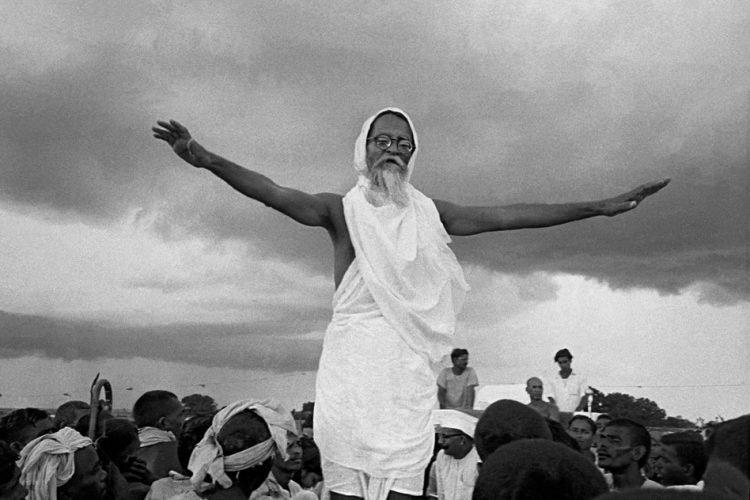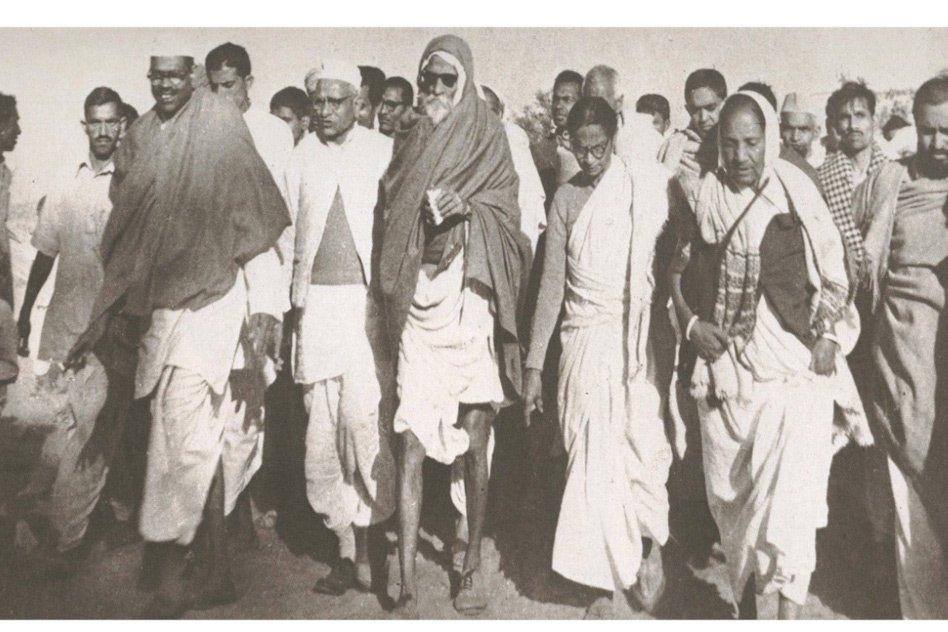Miss Alone
Prime VIP
The Freedom Fighter Who Walked 70,000 Km And Garnered 42 Lakh Acres Of Land For The Landless

In the mid-twentieth century, the post-Gandhian era in India bore witness to Bhoodan – a movement built on the Gandhian principles of love, compassion and selflessness. Acharya Vinoba Bhave (1895-1982), the founder of the movement, walked about 70 thousand kilometres in 14 years and received about 42 lakh acres of land in donation for landless farmers.
Considered as the spiritual successor of Gandhi, Vinoba Bhave was a freedom fighter and a spiritual teacher who advocated nonviolence, human rights and equality. He was born in a small village called Gagode in Maharashtra in 1895. At the age of 20, after a personal meeting with Gandhi at Kochrab Ashram in Ahmedabad, Vinoba abandoned his studies and participated in the activities at Gandhi’s ashram, like teaching, studying, spinning and improving the life of the community.
In the 1930s, Vinoba became associated with Gandhi in the independence movement, and was sent to jail in 1932 because of his activism against British rule. In 1940, Gandhi chose him as the first participant in his new Satyagraha campaign. Vinoba also participated in the Quit India Movement and served a five-year jail sentence.
Vinoba observed the life of the average Indian living in a village and tried to find solutions for the problems. In 1951, he initiated the Bhoodan (land gift) movement at Pochampally. He walked all across India asking people with land to consider him as one of their sons and voluntarily give him one sixth of their land. He then distributed those portions of land to the landless poor so that they could settle and grow some of their own food.

(Acharya Vinoba Bhave during Bhoodan Movement started in Andhra Pradesh on 15th April 1950)
Following this, the government of various provinces passed Bhoodan Acts which generally stipulated that the beneficiary had no right to sell the land or use it for non-agricultural purposes. Though the movement lost its flame in the 1960s, it made a significant contribution by creating moral ambience, putting pressure on landlords, and creating conditions favourable to the landless.
However, Vinoba has been sometimes criticized for his excessive imitation of Gandhi. He was strongly criticized for supporting the state of emergency imposed by the then Prime Minister Indira Gandhi. Vinoba called the emergency “Anushasana Parva” and advocated that it was required to teach people about discipline. However, in his last days he strongly opposed Indira Gandhi as she had ordered a shootout of the Sant Samaj.
In November 1982, Vinoba fell seriously ill and refused to accept any food and medicine. Finally, on 15th November, he passed away. He was awarded the Bharat Ratna posthumously in 1983.

In the mid-twentieth century, the post-Gandhian era in India bore witness to Bhoodan – a movement built on the Gandhian principles of love, compassion and selflessness. Acharya Vinoba Bhave (1895-1982), the founder of the movement, walked about 70 thousand kilometres in 14 years and received about 42 lakh acres of land in donation for landless farmers.
Considered as the spiritual successor of Gandhi, Vinoba Bhave was a freedom fighter and a spiritual teacher who advocated nonviolence, human rights and equality. He was born in a small village called Gagode in Maharashtra in 1895. At the age of 20, after a personal meeting with Gandhi at Kochrab Ashram in Ahmedabad, Vinoba abandoned his studies and participated in the activities at Gandhi’s ashram, like teaching, studying, spinning and improving the life of the community.
In the 1930s, Vinoba became associated with Gandhi in the independence movement, and was sent to jail in 1932 because of his activism against British rule. In 1940, Gandhi chose him as the first participant in his new Satyagraha campaign. Vinoba also participated in the Quit India Movement and served a five-year jail sentence.
Vinoba observed the life of the average Indian living in a village and tried to find solutions for the problems. In 1951, he initiated the Bhoodan (land gift) movement at Pochampally. He walked all across India asking people with land to consider him as one of their sons and voluntarily give him one sixth of their land. He then distributed those portions of land to the landless poor so that they could settle and grow some of their own food.

(Acharya Vinoba Bhave during Bhoodan Movement started in Andhra Pradesh on 15th April 1950)
Following this, the government of various provinces passed Bhoodan Acts which generally stipulated that the beneficiary had no right to sell the land or use it for non-agricultural purposes. Though the movement lost its flame in the 1960s, it made a significant contribution by creating moral ambience, putting pressure on landlords, and creating conditions favourable to the landless.
However, Vinoba has been sometimes criticized for his excessive imitation of Gandhi. He was strongly criticized for supporting the state of emergency imposed by the then Prime Minister Indira Gandhi. Vinoba called the emergency “Anushasana Parva” and advocated that it was required to teach people about discipline. However, in his last days he strongly opposed Indira Gandhi as she had ordered a shootout of the Sant Samaj.
In November 1982, Vinoba fell seriously ill and refused to accept any food and medicine. Finally, on 15th November, he passed away. He was awarded the Bharat Ratna posthumously in 1983.
